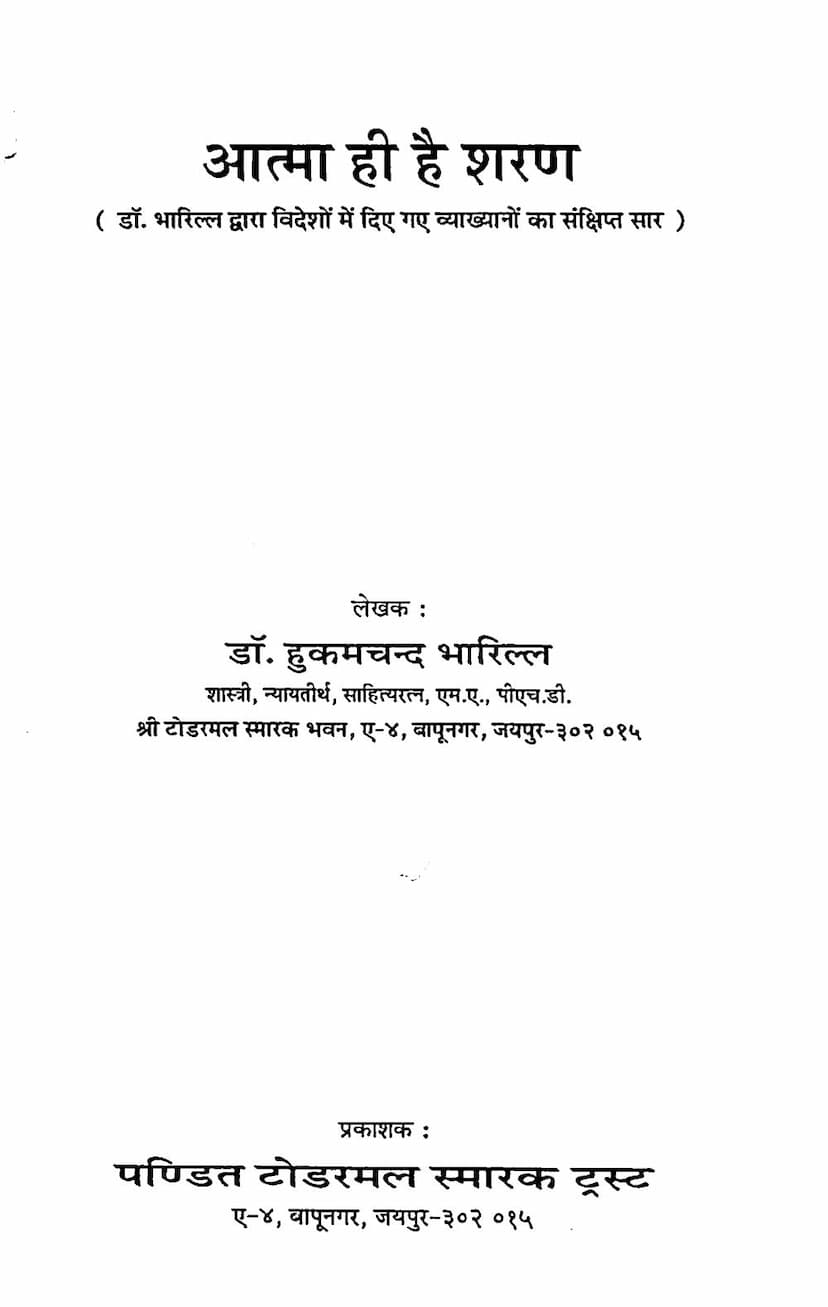Aatma Hi Hai Sharan
Added to library: September 1, 2025

Summary
Here's a comprehensive summary of the Jain text "Aatma hi hai Sharan" (The Soul is the Refuge) by Hukamchand Bharilla, based on the provided pages:
Book Title: Aatma hi hai Sharan (The Soul is the Refuge) Author: Dr. Hukamchand Bharilla Publisher: Todarmal Granthamala Jaipur
This book is a collection of lectures and teachings given by Dr. Hukamchand Bharilla to Jain communities abroad, primarily in America and Europe. The lectures aim to awaken spiritual consciousness among these overseas Indian Jains.
Core Message: The central theme of the book is that the soul is the ultimate refuge and the source of all true happiness and peace. Dr. Bharilla emphasizes that while the soul is inherently divine ("Atma hi hai Parmatma" - the soul is God), it can also attain godhood in its worldly manifestations through conscious effort.
Key Themes and Content:
- The Need for Spiritual Awakening Abroad: The book highlights the scientific and interconnected nature of the modern world. It notes the spread of the Jain community worldwide, especially in Western countries due to economic opportunities. A significant concern is the increasing disconnect of the younger generation abroad from their Jain heritage, language, and philosophy. The author stresses the responsibility of parents to impart spiritual and ethical values to their children.
- The Nature of the Soul: Dr. Bharilla expounds on the inherent divinity of the soul, explaining that all souls are, in their essence, God. Through self-knowledge, identification with the soul, and sustained focus, one can realize this inherent divinity and attain liberation. He uses relatable examples, like the "crorepati rickshaw-puller," to illustrate that while the soul is naturally divine, it can also manifest divinity in worldly life.
- The Path to True Happiness: The book posits that true and lasting happiness is not found in external possessions or worldly achievements but solely through the spiritual pursuit of the soul. Efforts directed towards worldly gains are temporary and ultimately lead to further suffering.
- Understanding Life, Death, Happiness, and Suffering: The author delves into the Jain perspective on the cycle of birth and death and the causes of happiness and suffering, attributing them to the soul's own karmic actions and attachments to external objects.
- Krambaddh Paryay (Sequential Stages of Manifestation): A significant and recurring topic is "Krambaddh Paryay," presented as a profound principle discussed even in overseas Jain centers. The author's revolutionary work on this topic has laid the groundwork for his reception abroad. This concept, relating to the sequential unfolding of spiritual states and their causes, is a testament to the intellectual curiosity of the overseas Jain community.
- Jain Bhakti and Dhyan (Jain Devotion and Meditation): The book sheds light on the essence of Jain devotion and meditation. Devotion is explained as a deep reverence for the qualities of the enlightened beings (Pancheparmeshthi) and a sincere aspiration to emulate them. Meditation is presented as a practice of focusing the mind on the soul, the true self, to realize its inherent divine nature.
- The Scientific Basis of Jain Practices: Dr. Bharilla skillfully connects Jain principles and practices with scientific reasoning. He explains the rationale behind traditions like vegetarianism, the Namokar Mantra, and concepts like night-canteen (night food avoidance) and water-filtration, demonstrating their alignment with health, hygiene, and natural principles. He argues that presenting Jainism in a scientific and rational manner is crucial for its acceptance in the modern, questioning world.
- The Importance of Self-Reliance in Spirituality: The author strongly advocates for self-reliance in spiritual pursuit. He emphasizes that the soul's liberation and happiness are entirely within its own capacity, not dependent on external deities or rituals. The ultimate refuge is the soul itself.
- The Power of Literature and Propagation: The text underscores the impact of literature in spreading spiritual knowledge. Dr. Bharilla's own writings, translated into multiple languages, have played a significant role in preparing the ground for his lectures abroad. The trust's efforts to translate and publish numerous Jain texts into English have been instrumental in reaching a wider audience.
- Examples and Analogies: Dr. Bharilla's lectures are rich with insightful examples and analogies that make profound philosophical concepts easily understandable. The story of the lost child at a fair and the child cleaning their own house are used to illustrate the difficulty of self-realization and the glory of right faith (Samyagdarshan), respectively.
- The "Aatma hi hai Sharan" Article: This specific article, along with the discussions on the Namokar mantra and meditation, are highlighted as particularly insightful and worthy of deep study.
- The Role of the Pandit Todarmal Smarak Trust: The book is a testament to the significant efforts of the Pandit Todarmal Smarak Trust, Jaipur, in propagating the philosophy of the "Vitaraag" (passionless) beings.
Travel and Engagement: The book details Dr. Bharilla's extensive travels and engagements across various cities in the USA, UK, Canada, Belgium, Japan, Hong Kong, and Gulf countries. It outlines the structured programs, lectures, question-and-answer sessions, and the overwhelming positive reception he received from the overseas Jain community. The author's dedication to a rigorous schedule, prioritizing spiritual discourse over personal comfort or sightseeing, is evident throughout the travelogues.
Overall Impact: "Aatma hi hai Sharan" serves as a beacon of spiritual guidance for Jains living away from their homeland. It reinforces the timeless wisdom of Jain philosophy, making it accessible and relevant to the modern global Jain population. The book not only aims to preserve their cultural and spiritual identity but also to deepen their understanding and practice of Jainism, ultimately leading them to the true refuge – their own soul. The book's popularity and the continuous demand for its message suggest its significant contribution to the spiritual upliftment of the Jain diaspora.